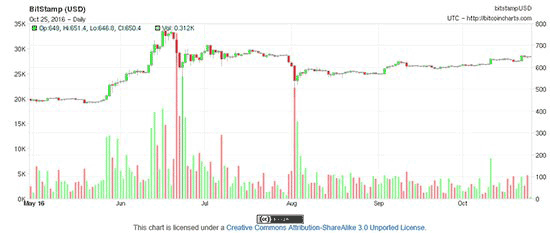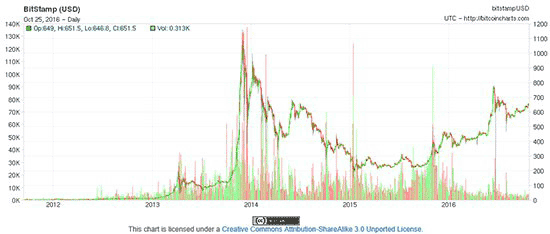With the exception of Wells Fargo (for obvious reasons) and basket case Deutsche Bank, earnings for the "big banks" have actually been pretty good this quarter.
But they've got a much bigger problem right now. According to New York Fed economists, large banks have over $140 billion invested in bad energy loans stemming from the oil crash. And they could be facing astronomical losses.
So it seems as though it's only a matter of time before the banks go to Hades in a handbasket - and take the rest of the stock market with them.
Now there's a camp of people who will tell you about a new "cash alternative" that's the best safe haven for your money.
It hasn't been fully embraced (yet), but it's already being called the "new world currency."
In the past 12 months alone, its transaction volume has increased by 110%.
It's got the potential to become an $8.2 trillion industry.
But before you ditch your gold bars...
You'll want to read this first.
Why Bitcoin Is Inching Closer to Becoming Your Financial "Safe Haven" - but It's Not There Yet
Back in November 2008, an anonymous cryptographer going by the pseudonym Satoshi Nakamoto created the first digital currency, or cryptocurrency, called Bitcoin. It's traded on digital exchanges such as Bitstamp. Now, it's not an actual coin or anything that you can physically touch - think of it as a digital asset that's found within a peer-to-peer (P2P) computer networking payment system.
Don't Miss: Why the First Bitcoin ETF Could Double the Price of Bitcoin
Users of this network are called "nodes," and they verify Bitcoin transactions by solving complex computer algorithms. Once verified, these transactions are recorded on a public ledger called a "blockchain," which is basically a virtual wallet. But there's no one true central authority overseeing these transactions. And at the moment, there aren't any government controls backing this digital currency, either.
Now, there are a lot of people out there who believe that Bitcoin could very well replace the U.S. dollar by 2031 - that's just 15 years away. I won't go so far as to say that Bitcoin is a "safe haven" for your money right now. But I do strongly believe that the technology behind the blockchain could be the reason a new global currency eventually replaces the U.S. dollar.
When the first Bitcoin transaction was placed on Jan. 12, 2009, its valuation was just pennies on the dollar. But in 2013, after the financial crisis in Cyprus exploded (and resulted in a shutdown of their banks and ATMs), many people within that region turned to Bitcoin. In fact, the buying volume was so massive - its price skyrocketed to over $260 per bitcoin. And by November 2013, it had increased by over 377%, peaking at $1,242 per bitcoin.
You can look at Brexit as another powerful example of the growing demand for this "digital gold."


At the time of the referendum (in June 2016), but when all bets were on staying in the UK, Bitcoin dropped from $1,242 to roughly $585. However, as soon as the shocking results came in, Bitcoin shot back up to nearly $700, with its new lows around $585.
Remember, while Bitcoin was soaring, the British pound and the stock market were taking a beating (and the pound still is). That's just one of the many reasons Bitcoin's been deemed "digital gold" and the new "safe haven" for your money.
Currently, it's trading at around $651. So the way I see it, if Bitcoin isn't valuable at all, it wouldn't be trading actively like it is.
Mining for "BitGold"
I admit that in 2013, I was one of those "pioneers" who bought a Bitcoin mining machine, and the timing couldn't have been better. When mining bitcoins, you're simply using a special software to solve math problems and are paid bitcoins in return. Nodes (users) add transaction records to Bitcoin's blockchain. This blockchain is what is used to verify and confirm transactions to the rest of the network.
[mmpazkzone name="in-story" network="9794" site="307044" id="137008" type="4"]
Get Our Best Wealth-Building Ideas: Money Morning's top 5 investment reports to grow your money like never before are right here - and they're absolutely free. Read more...
Bitcoin mining also involves a process called "halving," which is the tightening of the supply of bitcoins. When things first started, miners were given 50 bitcoins per every block they extracted. This is largely because people weren't as interested in - or were too skeptical of - buying bitcoins. But when the demand grew, that amount got cut in half (25 bitcoins for every block extraction) - and it's set to be cut again. With fewer new "coins" entering the system - and more people wanting them - you're looking at even higher prices over the next few years.
Like anyone else who's invested in this equipment, I was able to stake my claim before websites even allowed the buying or trading of bitcoins. It was really more of a learning experience for me over anything else, but I did end up pocketing a few digital coins before finally selling the machine (my wife complained about the noise and the heat it was giving off from all the processing power).
I still have some bitcoins in my portfolio, but this isn't because I see it as a "safe haven" or see it replacing the U.S. dollar in 15 years. At the end of the day, I'm a trader and would rather have it in the event that it does become more globally accepted and increases further in value. And that's what I tell my students every time they ask me if it's really worth buying.
Right now... Bitcoin doesn't hold the same weight as gold or even government bonds because all of the unknown factors. And it still hasn't been accepted by most governments, which is really the main reason why I'm not on the "new digital gold" bandwagon just yet.
But that could change in the future, as more and more businesses warm up to Bitcoin. Dell, Overstock, and CheapAir.com are just a few examples of vendors that already accept it. Furthermore, the Commodity Futures Trading Commission (CFTC) announced in September 2015 that it will hold the same status as a registered commodity in the United States (and will be covered by the Commodity Exchange Act).
Lastly, there are already a small number of derivative firms offering options and futures on bitcoins. And with the direction this potentially $8.2 trillion industry is going, I'm sure there will be many more to come.
So while I wouldn't go bartering your gold bars for bitcoins this second, it's definitely worth considering owning and even trading (that is, options). I know I will be...
This Is the Best "Retirement Stock" of 2016… And the good news is, it's trading for "pennies." But it won't be for long… its revenue is set to surge 4,709%. Learn the details of this $5 stock today while it's still "on sale.” Read more…
Follow Money Morning on Facebook and Twitter.
About the Author
Tom Gentile, options trading specialist for Money Map Press, is widely known as America's No. 1 Pattern Trader thanks to his nearly 30 years of experience spotting lucrative patterns in options trading. Tom has taught over 300,000 traders his option trading secrets in a variety of settings, including seminars and workshops. He's also a bestselling author of eight books and training courses.



